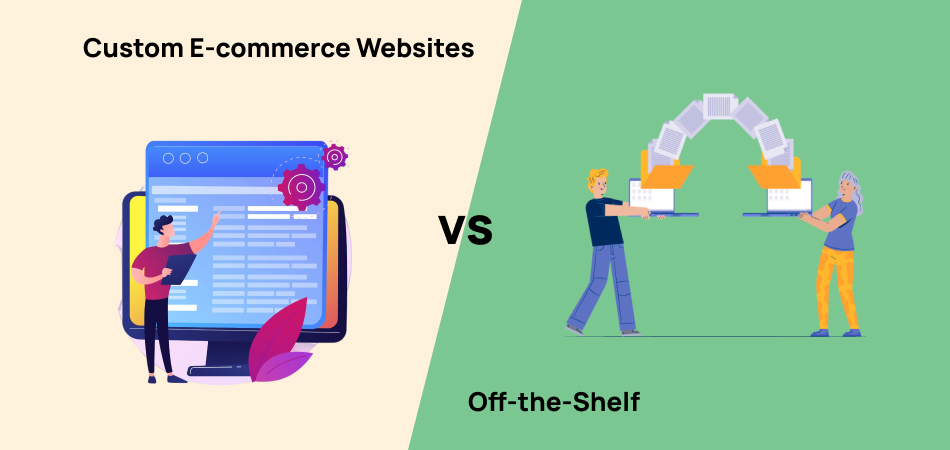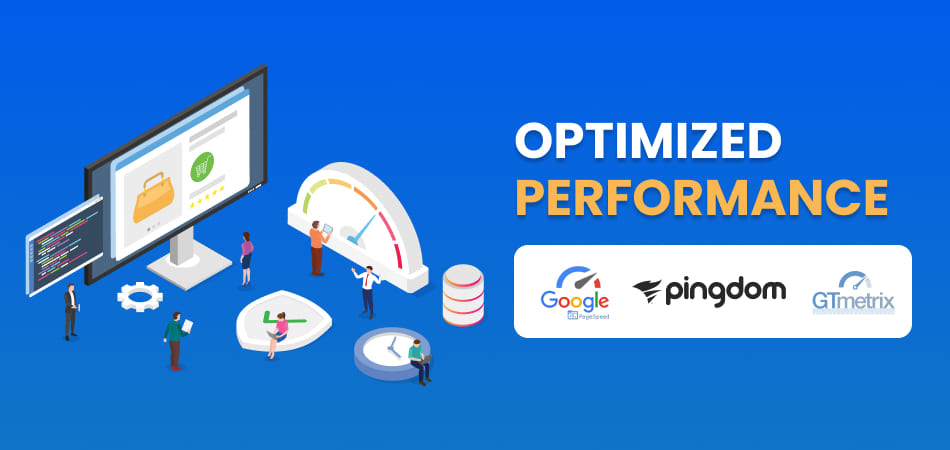In the digital age, establishing an online presence is crucial for businesses of all sizes. E-commerce has revolutionized the way we buy and sell products, making it essential for businesses to choose the right platform for their online store. One of the most significant decisions you’ll face is whether to build a custom e-commerce website or opt for an off-the-shelf solution. This article will explore the core differences, benefits, and drawbacks of both options to help you make an informed decision.
What are Custom E-commerce Websites?
Custom e-commerce websites are tailor-made platforms designed to meet the specific needs and requirements of a business. These websites are built from scratch, offering unique features, functionalities, and designs that align perfectly with the business’s goals and branding. Custom e-commerce websites provide unparalleled flexibility, allowing businesses to create a user experience that stands out from the competition and caters specifically to their target audience.
What are Off-the-Shelf Websites?
Off-the-shelf websites, also known as ready-made or pre-built websites, are platforms that are already developed and ready to use with minimal customization. These solutions come with a set of standard features and functionalities that cater to general business needs. Off-the-shelf websites are often provided by third-party vendors and can be quickly set up, making them an attractive option for businesses looking to launch their online store without significant investment in time and resources.
Difference Between Custom E-commerce Websites vs. Off-the-Shelf
The fundamental difference between custom e-commerce websites and off-the-shelf solutions lies in their development, functionality, and scalability. Custom e-commerce websites are tailor-made to meet specific business needs, while off-the-shelf solutions are pre-built platforms designed for general use. The table below outlines the core differences in detail:
| Aspect | Custom E-commerce Websites | Off-the-Shelf E-commerce Solutions |
| Development | Constructed from the ground up to satisfy particular company needs. | Pre-built platforms ready for use with minimal customization. |
| Cost | Higher initial cost due to custom development and design. | Lower initial cost with various pricing plans. |
| Time to Market | Longer development time due to custom coding and testing. | Faster time to market as the platform is already built. |
| Scalability | Extremely scalable and expandable to meet corporate needs. | Limited scalability; may require upgrades or changes as the business grows. |
| Customization | Fully customizable to fit specific needs and branding. | Limited customization options; constrained by platform capabilities. |
| Maintenance | Requires ongoing maintenance and updates by a development team. | The service provider is in charge of handling routine maintenance and upgrades. |
| Integration | Seamless integration with existing systems and third-party tools. | Limited integration options; depends on platform compatibility. |
| Security | Custom security measures tailored to specific needs. | Standard security features provided by the platform. |
| Ownership | Full ownership and control over the website and its features. | Limited control; dependent on the platform provider’s policies. |
| User Experience (UX) | Tailored UX designed to match the target audience. | Standard UX that may not cater to specific user needs. |
| Performance | Optimized performance for specific use cases and traffic. | General performance that may vary with traffic and usage. |
Benefits and Drawbacks of Custom E-commerce Websites vs. Off-the-Shelf
Choosing between a custom e-commerce website and an off-the-shelf solution depends on various factors, including budget, time, scalability, and specific business needs. Understanding the benefits and drawbacks of each option can help you make an informed decision.
Benefits of Custom E-commerce Websites
- Tailored to Specific Needs: Custom websites are built to meet your specific business requirements, ensuring that all features and functionalities align perfectly with your goals.
- Unique Branding: Custom development allows for unique and distinctive branding, setting your business apart from competitors.
- Scalability: Custom websites can be scaled easily to accommodate business growth, new features, and increased traffic.
- Full Control: You have complete ownership and control over the website, including design, functionality, and updates.
- Seamless Integration: Custom websites can integrate seamlessly with existing systems, third-party tools, and APIs, providing a cohesive experience.
Drawbacks of Custom E-commerce Websites
- Higher Initial Cost: The cost of custom development is significantly higher due to the need for specialized skills, design, and development time.
- Longer Development Time: Building a custom website takes longer, which can delay your time to market.
- Ongoing Maintenance: Custom websites require regular maintenance and updates, which can be costly and time-consuming.
Benefits of Off-the-Shelf E-commerce Solutions
- Lower Initial Cost: Off-the-shelf solutions are more affordable, with various pricing plans to fit different budgets.
- Faster Time to Market: These platforms are ready to use, allowing you to launch your online store quickly.
- Ease of Use: Off-the-shelf solutions are designed for ease of use, with user-friendly interfaces and minimal setup.
- Regular Updates: The service provider handles updates and maintenance, ensuring your website stays up-to-date with the latest features and security measures.
- Support and Resources: Off-the-shelf platforms typically offer extensive support, documentation, and community resources.
Drawbacks of Off-the-Shelf E-commerce Solutions
- Limited Customization: Customization options are limited, which may not fully meet your specific business needs.
- Scalability Issues: Off-the-shelf solutions may struggle to scale with your business growth, requiring upgrades or platform changes.
- Dependency on Provider: Your website’s functionality and security are dependent on the platform provider’s policies and updates.
- Generic User Experience: The standard user experience may not cater to your target audience’s specific needs.
- Integration Limitations: Integrating with existing systems and third-party tools can be challenging and may require additional workarounds.
Conclusion
Deciding between a custom e-commerce website and an off-the-shelf solution requires careful consideration of your business needs, budget, and long-term goals. Custom e-commerce websites offer tailored solutions, unique branding, scalability, and full control, making them ideal for businesses with specific requirements and the resources to invest in development and maintenance. But, they do have lengthier development durations and greater upfront expenditures.
On the other hand, off-the-shelf e-commerce solutions provide a cost-effective, quick-to-market option with ease of use, regular updates, and support. They are suitable for businesses looking to launch their online store quickly and affordably but may face limitations in customization, scalability, and integration.
Ultimately, the best choice depends on your business’s unique needs and goals. If you require a highly customized solution that can grow with your business and provide a unique user experience, investing in a custom e-commerce website may be the best option. However, if you need to get your online store up and running quickly and cost-effectively, an off-the-shelf solution can be an excellent starting point. By weighing the benefits and drawbacks of each approach, you can make an informed decision that aligns with your business strategy and ensures the success of your online store.



